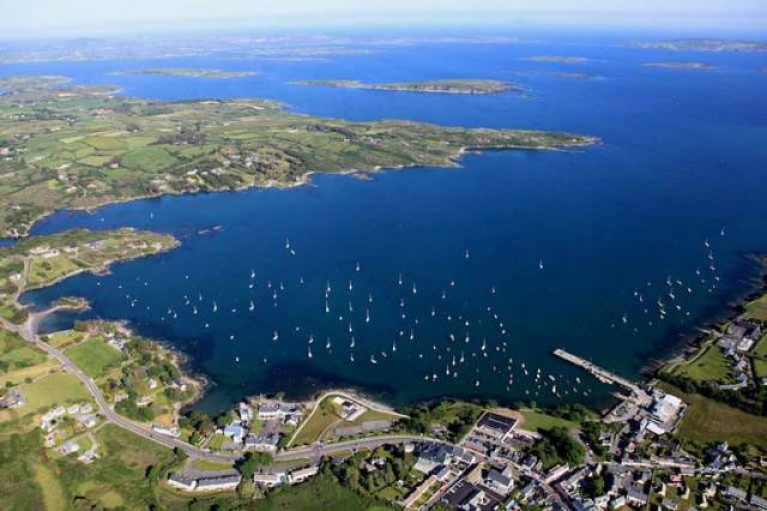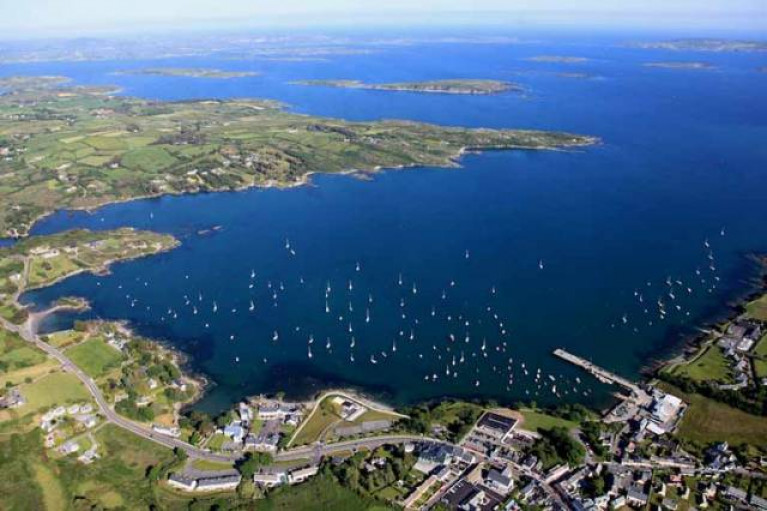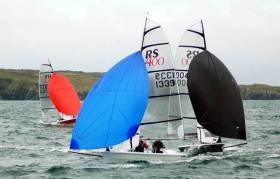Displaying items by tag: Schull Harbour
Schull Harbour Regeneration Plan Directors Mull Over ’Next Actions’ After Expiry of Planning Permission
Directors of the Schull Community Harbour Development Company Limited (SCHDC) say they have met to discuss “next actions” and “continue to consider all options available” following the expiry of planning permission for redevelopment of the West Cork harbour.
In a letter to its supporters, the SCHDC provided a timeline of its efforts over the last 20 years to get the project over the line.
Planning permission was initially granted in 2007, and further extended in 2017, for works that were to include various pier improvements such as an extension and floating pontoon, as well as a 225-berth marina.
However, two separate applications for funding under the Rural Regeneration Fund were unsuccessful, despite what the SCHDC claims was a “commitment that funding would be approved”.
Cork County Council subsequently refused to submit the project for the third tranche of funding, as previously reported on Afloat.ie, instead backing the Dursey Island cable car which itself was unsuccessful in securing funding.
 Schull’s community-procured pontoon was opened to the public in mid 2018 | Credit: Robert Bateman
Schull’s community-procured pontoon was opened to the public in mid 2018 | Credit: Robert Bateman
Last year, the company’s application for a further extension of planning permission was refused by the local authority. An appeal to An Bord Pleanála was also rejected as not within its remit, and planning permission officially expired in October.
“As board members, we are deeply disappointed that we have, to date, been unable to deliver this project as we had earnestly hoped we could,” the company writes.
“The project would be of enormous benefit to Schull, the Mizen and wider West Cork economy and appears to have had broad political support. Unfortunately, this support was insufficient to get the project over the line on this occasion.”
One “notable success” of its efforts, the company says, was the provision of a new walkway and community pontoon delivered by Cork County Council in 2018 which “clearly demonstrates the need and potential of our overall project proposals”.
The company concluded: “We wish to express our thanks to all the subscribers and supporters of the initiative and will of course provide further information as it becomes available.”
Close Racing to End Schull Sailing Season in West Cork
Close racing is expected at Schull Harbour Sailing Club in West Cork on Saturday when the final league racing of the season takes place.
Sean Norris, Commodore at Schull Sailing Club, says: "We are wrapping up our season here this week with junior sailing having concluded at the end of August, while this Saturday will see the end of the club's "on-the-water" activities for 2021 with the sixth and final race of the Autumn league. The Cruiser fleet will have completed 14 club races during the season."
Closest finishing will be in Division 2 IRC and Standard ECHO where the leader is Raffles (Kirby/Norris) on 6 points; 2nd Witchcraft (Simon Nelson) 8 points; 3rd Le Perle Noir (Deborah Crowley) on 10 points. Sittelle (Tom Newman) has 11 in 4th place and Excelsior (T.O'Brien) 12 in 5th. It should be an interesting finishing situation there. In Division 1 IRC and Standard ECHO, the advantage is to Flor O'Riordan's 3 Cheers which leads on 4 points. But there will be close contest for 2nd and 3rd. Brazen Huzie (Tadg Dwyer) is 2nd on 11 and Mackey G (John McGowan) just one point behind in 3rd.
 Sean Norris, Commodore at Schull Sailing Club
Sean Norris, Commodore at Schull Sailing Club
Women at the Helm
Also on Saturday, for the first time, the club will have an Under 25 All-Female team comprising Caoilainn O'Regan Helm, Tarah Fleming Tactician along with crew of Gabby Hogan, Aoife Nash & Eimear O'Regan, All former pupils of Schull Community College, sailing in a 1720 at the Women at the Helm Event at Royal Cork Yacht Club.
Superb sailing conditions arrived in West Cork for the fleet of 13 cruiser-racers competing in Saturday's Schull Harbour Sailing Club race.
The third time was a charm for the O'Brien family on Excelsior in Class Two Echo and IRC, winners for the third week running.
The winner in Class One Echo was Martin Lane and the crew of Chatterbox with Flor O'Riordan taking the Honours in IRC.
 A 13 boat mixed cruiser fleet are contesting Schull Harbour Sailing Club's Summer Saturday Series
A 13 boat mixed cruiser fleet are contesting Schull Harbour Sailing Club's Summer Saturday Series
Calves Week Reaches Maximum Entry
Meanwhile, SHSC Commodore Sean Norris confirmed that entries for Calves Week 2021 has closed earlier than expected having reached the extended cut of 60 entrants.
Schull Sailing Club was founded in the West Cork harbour in 1977. Once a thriving fishing community, like other coastal areas that aspect of the village has diminished, but sailing has continued to develop.
However, when Cork County Council didn't put forward the planned marina at Schull as a project for funding, it was a setback for the development of facilities that sailing needed.
That has not deterred the club, though Commodore Sean Norris says it leaves an "uncertain position" about the hopes for a marina there.
 Sailing at Calves Week in West Cork Photo: Bob Bateman
Sailing at Calves Week in West Cork Photo: Bob Bateman
The club's major organisational effort is Calves Week Regatta and that is going ahead this year, scheduled for August 3-6 with entries already in and strong support coming from the smaller and older boats, which is at the biggest level seen for the event in recent years. There is also a good level of interest from visiting East Coast boats.
 Sailing round the Fastnet Rock at Calves Week 2019 Photo: Bob Bateman
Sailing round the Fastnet Rock at Calves Week 2019 Photo: Bob Bateman
Commodore Norris is my guest on this week's Podcast, where he urges visitors to bring with them going ashore transport and says that, though onshore arrangements have to be mitigated because of Covid restrictions, he is optimistic for the Summer sailing season and positive about the future of the club.
Listen to the Podcast below
Schull Harbour Sailing Club Confirms Calves Week Regatta 2021 for August 3-6 in West Cork
The Commodore of Schull Harbour Sailing Club, Sean Norris, has confirmed that the 2021 Calves Week Regatta in West Cork is going ahead as planned in August.
Calves Week has had a strong interest and has received 17 entries across all classes to date with reports of interest in entering also being expressed by some high profile new and returning campaigners.
"I would like to confirm that with the current easing of the Health Restrictions, our event will proceed on the previously announced dates of August 3rd to 6th, 2021" Norris told Afloat.
 Class Zero yachts Rockabill (on starboard) and Eleuthera competing in the 2019 Calves Week. Photo: Bob Bateman
Class Zero yachts Rockabill (on starboard) and Eleuthera competing in the 2019 Calves Week. Photo: Bob Bateman
Notably, the regatta has a number of entries to date in Class 4 and with more expected, Norris believes this will probably be the biggest in participation numbers in any regatta for a number of years.
 Calves Week Race Officer Alan Crosbie
Calves Week Race Officer Alan Crosbie
On the water, it will be very much business as usual at the CD Environmental sponsored Calves Week with Alan Crosbie returning as Race Officer, and organisers also hope to have some new course options available for participants.
"We are very hopeful that the heath regime will be very different by the time our event comes around but we are equally satisfied that all the necessary arrangements are and can be put in place to enable the event to proceed even if we do not move forward significantly from where we are now", Norris said.
"While things will be different ashore this year, we would ask all participants to bear with us and the local businesses in ensuring that all is done in accordance with whatever guidelines are in place at that time so that everyone can enjoy our event in the safest possible way, he added.
Cork county councillors have expressed further frustration at the local authority’s decision not to submit the Schull Harbour regeneration project for rural development funding.
As previously reported on Afloat.ie, hopes for the multi-million-euro improvement scheme for the West Cork sailing centre were dashed at the end of last year as the project’s planning permission is running out.
The Southern Star reports that while the deadline for submissions passed more than a month ago, councillors have continued to criticise the authority for its decision.
It’s understood county engineers were of the position that construction would not begin until just weeks before expiry of planning permission in October 2022, though this situation has been repudiated by the harbour company.
However, the administration has also warned that any renewed planning permission for the harbour breakwater portion of the development — which was rejected by An Bord Pleanála — “could be much more difficult to obtain” than before.
The Southern Star has more on the story HERE.
Demand for Answers as Council Dashes Hopes for Schull Harbour Regeneration Project
Hopes for funding for a massive regeneration of Schull Harbour have been dashed as its planning permission is running out.
According to the Southern Star, in the West Cork sailing centre has twice been proposed by Cork County Council for rural regeneration funding administered by the Department of Rural Affairs.
The €5 million plans, which follow on from the community-procured pontoon that opened in mid-2018, include a 225-berth marina and slipway with a breakwater.
But a meeting in November heard that even if the project were to be approved, construction would not begin until a month shy of is planning permission expiry in October 2022.
It’s reported that factors influencing the change in stance include the refusal of the breakwater portion of the development, which raises conservation concerns.
Now the council has been asked to explain its about-face on the matter after “20 odd years of hard work”.
Writing to the same newspaper, local resident and businessman Denis Quinlan says he is “deeply concerned at the flippant response of Cork County Council to this very important project that could mean so much to the commercial sustainability of the entire Mizen peninsula”.
The Southern Star has more on the story HERE.
Update 30 December 2020: The story has been edited to clarify the statement on the refusal of planning permission for the breakwater. The original statement misconstrued its relationship to local conservation concerns.
RS400 & RS200 Fleets Put on A Show At Fastnet Marine Centre, Schull
33 RS’s travelled to Schull last weekend to battle for the National title. The event, kindly sponsored by Centra, saw 10 races completed for each class across two race courses with sailors experiencing the perfect mix of conditions. IRO Alan Crosbie & team took charge of the RS400 fleet South of Long Island and NRO David Harte & team took charge of the RS200 fleet outside Schull Harbour near Castle Island.
Friday- Glorious sunshine and light steady breezes ranging from 5 – 8 knots made for challenging but fair racing. The RS400’s completed all four races, two of which were sailed outside Long Island in dying breeze and two of which brought sailors back inside the sound where the breeze was just about holding up. In the RS400’s, reigning national champions Alex Barry & Richard Leonard appeared to have had a good day with a 1,1,3,4 only to have been OCS in race 1 which meant Bob Espey and Tiffany Brien took the overnight lead with a 5,3,1,3. The weekend was to continue to be a battle between the two teams with it going right to the wire on Sunday. There were four different race winners on the day with class stalwarts Emmet & James Ryan taking race one and laser supremo Chris Penney and Simon Martin taking race four. Katie Tingle and Fionn Lyden deserve a mention for leading to the first windward mark in race four in what was their first outing ever in an RS400 and likewise, a strong performance on the day for Laser Radial sailor Johnny Durcan and crew Grattan Roberts who sat in 5th overnight.
The RS200’s managed three races on Friday, Neil Spain and crew Shane Hughes had no intentions of being bridesmaids again and lead the unstoppable Marty O’Leary and Rachel Williamson by one point overnight. It seemed this was a sign of the weekend to come with the two boats continuing to blaze a trail on the rest of the fleet for the weekend. Jocelyn Hill and Katie Kane from Antirm had a great day and lay in 3rd place overnight.
Super Saturday: An earlier start of 11am on Saturday allowed for four races to be completed by both fleets. Winds had increased considerably from Friday and sailors enjoyed the perfect RS conditions with a South Easterly wind blowing 15 – 20 knots all day. The new breeze meant for a change in faces at the top of the RS400 fleet. Class President Dave Cheyne and Stevie Kane having sat 13th overnight came out blazing with a 1,2 in the first two races and scored an impressive 15 points on the day having scored 50 the previous day. Likewise David Rose and Ian Hef had a very strong day with a 3,7,2,2 to score 14 points having scored 49 the previous day. At the top of the fleet things weren’t looking good for the leaders with Bob & Tiff scoring a DNF in race one having to return to shore with slot gasket issues and Alex & Richie broke a rudder before the race but just made the start having secured a replacement. Bob & Tiff were back out of the blocks and recovered to score a 1,4,4 with Alex & Richie under pressure after a 4,5 managing to close the day with a 1,1. This left Alex & Richie in the lead by a mere 2 points going into the last day. The day took its toll with sailors bruised and battered but still smiling and three boats on their side over night as their owners prayed that the replacement slot gaskets would dry overnight.
In the RS200’s Neil and Shane took the spoils scoring an impressive four 1st places and showing they meant business. Marty & Rachel had a DNF in the first race but came back out to take three 2nd places. Past President Frank O’Rourke with local sailors Noah McCarthy were back on form with four 3rd places on the day but consistency on day one was rewarding Royal St. George pair Toby Fowler and Greg Arrowsmith who sat in 3rd place overnight. Special mention must go to the three boats from Cullaun Sailing Club who persevered on the day and particularly Aoife Cleary Ward and Niamh Edwards who were still smiling coming up the slip.
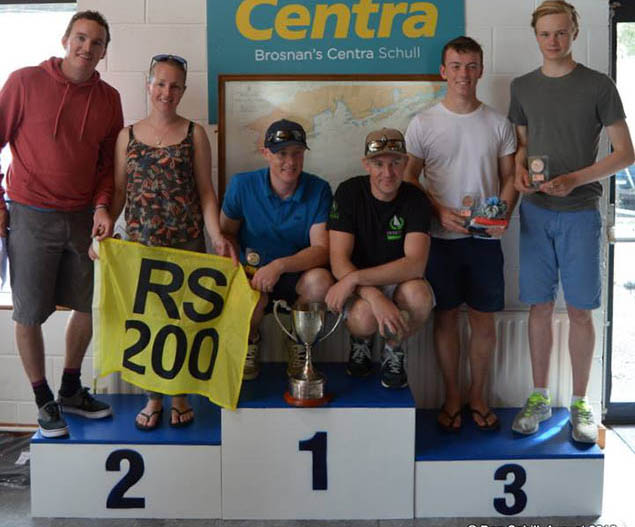 The RS200 Prizegiving
The RS200 Prizegiving
Sunday: The RS400’s had two final races on Sunday with all three medal positions up for grabs. Sailors were greeted outside by a giant Atlantic swell and very light and shifty conditions as the sea-breeze fought the thermal North Westerly. With Alex and Richie scoring a 2nd over Bob and Tiff’s 3rd in race one Paddy Power had the odds in the Cork boys favour. All they needed was for Bob and Tiff not to win the race or for them to score a fourth but having hunted each other down in two general recalled starts, the Northern team slipped away on the first beat and found the best breeze to lead by ‘miles’ at the top mark, a lead they carried safely all the way to the finish. Alex & Richie were left at the back of the fleet having fallen foul to the conditions and could only watch on as Bob Espey and Tiffany Brien crossed the line to secure the 2016 National Championships by one point, this being Bob’s second time securing the trophy and first time winning the event outright. Alex and Richie did enough for second place and Emmet and James Ryan did enough to fight off the pressure from young guns Johnn Durcan and Grattan Roberts to take third place and the bronze ISA medal.
The RS200’s needed three races to complete the card and with it all but sewn up, Neil and Shane had a scare in race 1 scoring a 3rd while Marty & Rach took the bullet. This wasn’t enough to phase the experienced pair who went on the win race two giving them the 2016 National Title and the freedom to head home early and miss the last race. A convincing win for the boys left them with 9 points and Marty & Rachel went on to win the final race giving them the silver medal on 13 points. Toby Folwer and Greg’s consistency continued as they scored a 2,5,2 on the day securing them the Bronze medal.
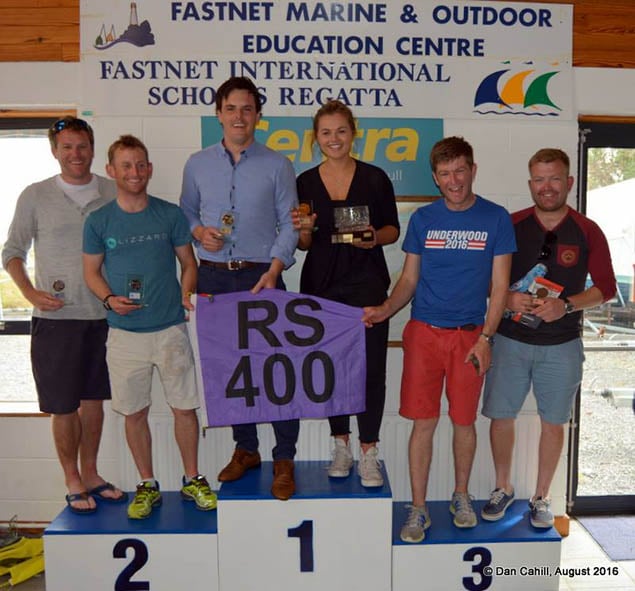 The RS400 Prize Giving
The RS400 Prize Giving
Social: Brosnan’s Centra in Schull kindly layed on a BBQ immediately after sailing each day which was very well received by sailors. Despite the tiring conditions of Super Saturday and impromptu party kicked off in the upstairs of Newman’s bar with massive craic had, a South v North sign off, apt for the year that’s in it, adding to the banter. Special mention for John Downey and Stevie Kane who’s countries can be very proud of their performances on the night.
All in all an excellent weekend was had by all, only made possible by David Harte and his massive team in the Fastnet Marine Outdoor Education Centre in Schull including RS400 OOD Alan Crosbie, the generous support from Centra, the people of Schull for providing camping facilities, good food and tasty pints.
Full results here
The next event for the classes is the end of seasons in Blessington SC on the 24th & 25th September.



























